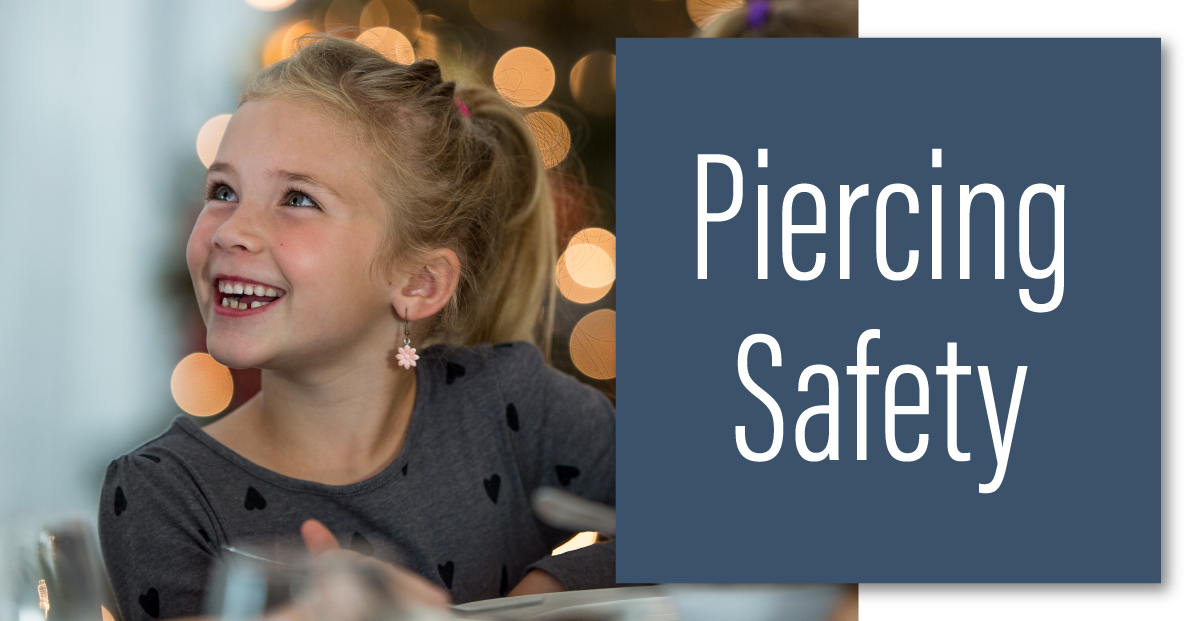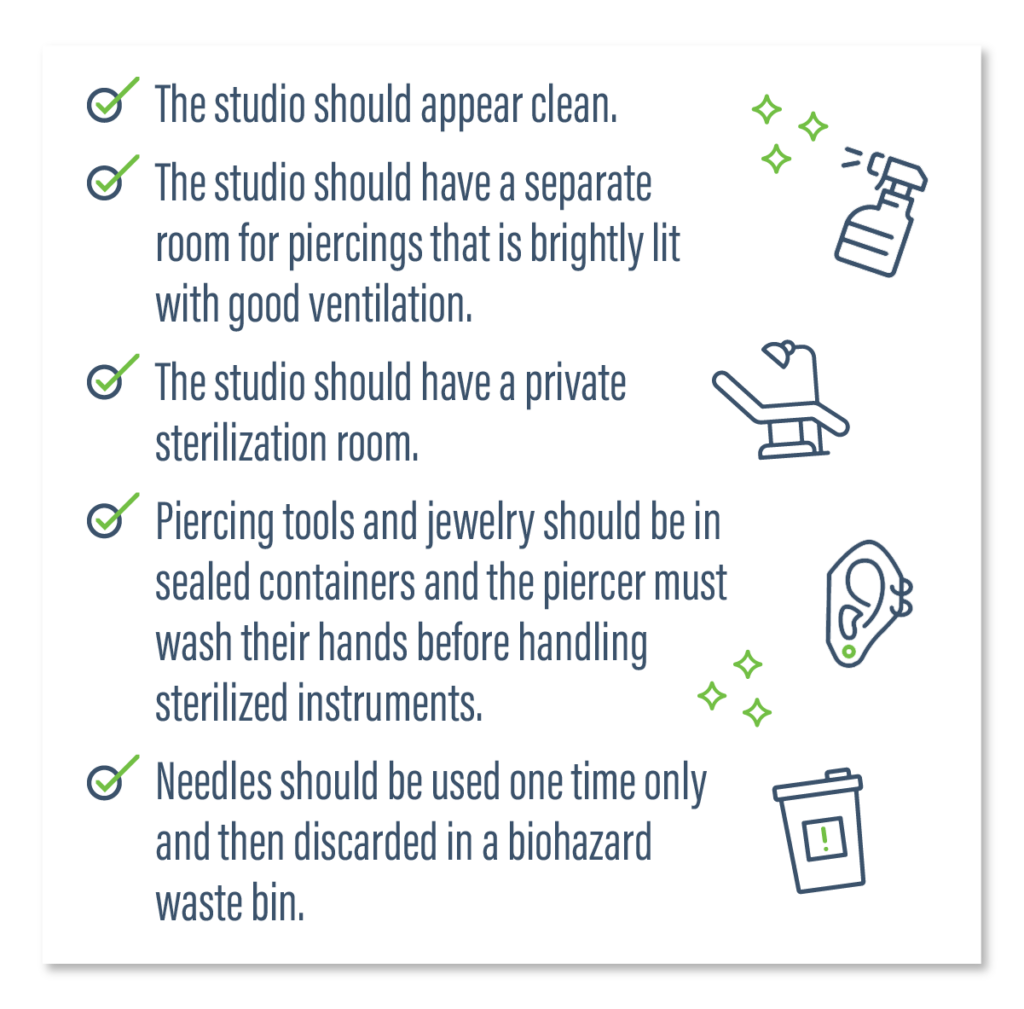
April 3, 2024
If you’re considering a new piercing or your children are asking for their ears to be pierced, you need to know these safety precautions and tips to protect from injury and infection.
What Are the Complications Associated With Ear Piercings?
You might not hear about it often, but many people who get their ears pierced experience complications, discomfort or infection afterward. In a survey, 35% of people questioned following a piercing stated that they experienced various complications. These can arise for several reasons, from unclean piercing instruments to an allergic reaction to the jewelry used in the process.
Where Should I Get My Ears Pierced?
If you choose to get a piercing or allow a minor to get a piercing, choosing a reputable, clean establishment is vital. “If you make the choice to get an ear piercing, it’s vital you choose a reputable piercing provider who abides by the Texas Health and Human Services’ regulations,” said Coryell Health provider Amy Bass, APRN, FNP-C.
You should look for this standard setup:

Are Piercing “Guns” or Needles Safer?
Piercing guns are never a good alternative to piercing needles, according to the Association of Professional Piercers. Piercing guns can’t be properly sanitized, are prone to malfunctions and may cause significant tissue damage. Needles create a small hole in the tissue where jewelry is then inserted, so the skin heals around the new path created by the needle. A piercing gun, which tears through the skin, is usually more painful and may cause swelling and potential infection. On top of these issues, training for gun piercing is not standardized, which can lead to inadequate expertise and misuse of the device.
“For young children, you also may want to select an earring with a screw locking mechanism that reduces the risk of the earring back coming off and becoming a choking hazard,” said Coryell Health family nurse practitioner Amy Bass.
How Important is Earring Selection?
Choose earrings made of hypoallergenic materials, such as sterling silver and 14-, 18- or 24-karat gold. These types of metals are not likely to cause an allergic reaction. Note that nickel frequently causes allergic reactions, so be sure the jewelry selected for piercing doesn’t have nickel during the piercing process and wait to replace the earrings until completely healed.
Some individuals will still react to stainless steel, silver and even white gold, as they may be mixed with nickel, which could lead to an infection depending on your skin’s sensitivity. Wearing 14K yellow gold earrings consistently throughout the first year may help avoid irritation and complications. Consider the upfront cost of quality metal earrings as an investment in long-lasting, healthy piercings.
“About 35% of ear piercings result in a complication of some kind, so you’ll likely need some sort of medical intervention,” Amy Bass, APRN, FNP-C, said. “Sometimes the back or front of the earring can get embedded in the skin of the ear, which could also become a problem. If you notice an embedded earring back or pain, redness, puss or swelling that lasts longer than 24 hours after the piercing, we advise you to contact your doctor for an examination.”
How Can You Prevent Complications?
What can you do at home?
- Always wash your hands with soap and warm water before touching your ears or earrings.
- If you touch your new piercing with dirty hands that haven’t recently been washed, germs will transfer and could lead to an infection.
- Clean with saline solution.
- Use the saline solution provided by your piercer three times a day for six weeks for an earlobe piercing. After the healing period has ended, it is recommended that you continue using your ear care solution as needed to keep your new piercing and earrings clean.
- Avoid harsh cleansers.
- Avoid cleaning your piercing with hydrogen peroxide or antibacterial soaps, which can damage your healing skin.
- Don’t touch.
- Avoid touching the new piercings, except when cleaning them.
- Moving or rotating jewelry is not necessary during cleaning/rinsing and may actually irritate the piercing.
- Leave jewelry in your ears at all times. Even well-healed piercings can shrink or close in minutes! If removed, reinsertion can be difficult or impossible.
- Try to keep your hair away from your new piercings.
- To prevent bacteria from transferring from your hair to your new piercings, try braiding, using a hair tie or wearing a headband to pull your hair back at night for at least the first month.
- Having hair pulled away from piercings will also keep hair from getting caught on your earrings. Ouch!
- Use petroleum jelly as needed.
- Using the squeeze tube variety to prevent contamination, gently apply a thin coat of petroleum jelly around each opening. This will keep the piercings moist and less painful.
- Avoid swimming until piercings are fully healed.
- While healing, stay out of pools, hot tubs, lakes, and oceans because this could increase the risk of infection.
- Don’t remove earrings too early.
- Leave earrings in for eight weeks, giving your ears time to heal.
“To prevent irritation or damage to your freshly pierced ears, it’s crucial to avoid harsh products and excessive touching,” adds Amy Bass, APRN,
FNP-C.
If you choose to get a piercing, it is important to note that complications are possible even if you follow these precautions, but these safety precautions can reduce the risks! If you have concerns about a possible current infection, call your doctor right away.
Save and print this Caring for New Piercings PDF and post it in a visible spot so the information is easy to access. If you’re thinking about a piercing for you or your child and are still worried about how it might affect your health, call (254) 248-6204 to speak with Amy Bass, APRN, FNP-C with Coryell Health’s Advanced Wound Center for more information
 Skip to content
Skip to content
